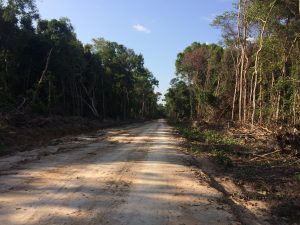A prominent Cambodian environmentalist has been arrested along with five others while investigating illegal logging in a national park, the latest instance of the government’s growing intolerance for environmental activism.
In a statement yesterday, the human rights group Licadho reported that Ouch Leng and five colleagues were arrested by “mixed armed forces officers” on Saturday morning in Stung Treng province in northeastern Cambodia. The six “were later moved to the provincial police headquarters and are still being questioned by authorities as of Sunday morning.”
In 2016, Leng was awarded the prestigious Goldman Environmental Prize for his undercover work aimed at documenting and exposing the corrupt networks that sustain illegal logging in Cambodia. In addition to Leng, the group included Heng Sros, Tat Oudom, Out Latin, Men Mat, and one other person that Licadho did not identify.
At the time of their arrest, Licadho said, Leng and his colleagues were investigating logging operations within the 280,359-hectare Veun Sai-Siem Pang National Park, where a firm called T.S.M.W. has held an economic land concession since 2022. The Cambodian government established the Veun Sai-Siem Pang National Park in 2016, and Conservation International has described it as one of “Southeast Asia’s most pristine forests.” It also contains “one of the most extensive ancestral lands for Indigenous communities within any protected area” in Cambodia.
The Associated Press confirmed the arrests with a spokesperson for the provincial government, who said that the six were detained after ignoring instructions from authorities to leave the forestry area where no access is allowed. He said authorities “were strictly guarding the site against illegal logging and land grabbing,” in the AP’s paraphrase.
While it remains unclear whether the group will be charged with any crimes, Prime Minister Hun Manet’s government has displayed an increasing intolerance for any form of environmental activism that confronts the root-causes of the country’s ecological problems: a political economy marked by political patronage and elite impunity.
In July, a Cambodian court sentenced 10 members of the environmental group Mother Nature Cambodia to lengthy prison terms, after convicting them of insulting the king and plotting to overthrow the government. Three of the defendants were sentenced to eight years in prison and fined $2,500 each on the two charges. The remaining seven activists were sentenced to six years in prison.
Leng’s work has previously brought him into collision with the Cambodian authorities. In February 2021, he was arrested with four other environmental activists in Prey Lang Wildlife Sanctuary in Kratie province, which lies to the south of Stung Treng. Ouch Leng and his colleagues had been collecting evidence of illegal logging in an area adjacent to a concession operated by the Cambodian subsidiary of South Korea’s Think Biotech Co. Ltd. The activists were later freed from the provincial Forestry Office where they had been held after being forced to sign a document pledging to cease their activities in Prey Lang without permission from the Ministry of Environment.
More broadly, the arrest of an internationally recognized environmental activist is a further sign of the Hun Manet government’s growing indifference to Western opinion. The logic of international human rights awards like the Goldman Prize is that they increase international awareness of the issues in question, while giving the individual activist a reputational boost that protects them in some measure from oppression.
However, as was shown with the arrest last month of the freelance journalist Mech Dara, whose work on Cambodia’s gargantuan online scamming industry was recognized by the U.S. State Department, international recognition is no longer any guarantee of protection from government crackdowns in Cambodia. Indeed, things are fast moving to a situation in which it will be the reverse.

































